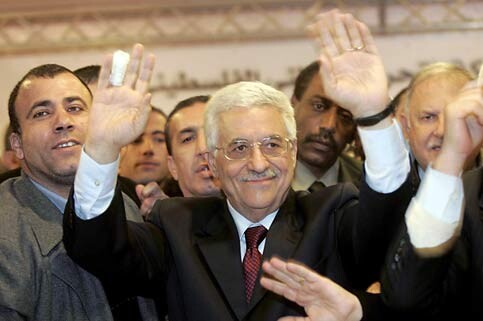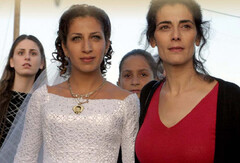The Electronic Intifada 10 January 2005

Palestinian President Mahmoud Abbas celebrates his election victory in Ramallah, 9 Januuary 2005. (ALFRED/SIPA)
Turned out in his best formal suit, a neatly folded kuffiya carefully draped over his shoulders, Mahmoud Abbas smiles with confidence and anticipation as he is carried aloft by celebrants and supporters on this festive day. Just looking at him, you can tell he probably even smells nice, anointed with the fragrance of victory. The elections were a foregone conclusion, the polling a compulsory ritual, all meant to legitimate what everyone already knew: Abbas was the one and only.
The hubbub of voters attending this electoral rite of passage yesterday was reminiscent of a Palestinian wedding. Abbas, though nearing 70, is a presentable groom: calm, handsome, clean-shaved. He has never appeared in public in rumpled military fatigues while carrying a gun. Abbas understands his role and plays it respectably; he’s level-headed, calculating, and realistic.
Abbas is not an idealist, nor is he given to passions. His business-like demeanor spells “dependability,” and clearly pleases the Israeli and US governments. But they are not the bride, nor even the parents of the bride. So just who is being courted and betrothed here? Where, indeed, is the bride?
If this election is like a wedding, it is a surreal, even pantomime, marriage, a show presented partly for distraction, but mostly to suit other interests and desires that do not coincide with the expected reasons — and requirements — of most elections or nuptials. Yesterday’s polls were heavy on symbolism, hope and hype, and rather light on emotions as well as the crucial structures of governance and the sorts of powers one would expect a president to wield. But on this festive day, such doubts were brushed aside so that all could admire the handsome and suitable groom while placing unrealistic hopes on his shoulders.
Yesterday’s elections did not choose a president so much as they formalized a rite of passage in the upper ranks of Fatah, passing the mantle of leadership of the Palestinian Authority (not the Palestinian people) from the late Yasser Arafat to Mahmoud Abbas, a.k.a., Abu Mazen.
The poll, this stilted, shotgun wedding, had a strange energy — drained, anemic, and hesitant. Few seemed genuinely enthusiastic. The bride was not there, after all, and big issues and concerns were also missing. Universal human rights and international humanitarian law were not honored guests at this celebration. Inviting them might have elicited passions. Had that happened, Abu Mazen might have lost his title of “moderate candidate.”
This description implies that the contender in yesterday’s elections, Dr. Mustafa Barghouti, was a fiery and dangerous radical or an advocate of violence. He is neither. Rather, Barghouti is a medical doctor and a respected human rights activist who is highly regarded as an earnest, intelligent, hard-working man of integrity, someone who’d like to change the status quo, discuss the rudiments of a just society, widen political participation, and in general shake things up constructively.
But idealistic men possessing more convictions than pragmatism are rarely considered good marriage prospects, as anyone who has heard Lebanese composer Ziad Rahbani’s wry song (1) about his engagement to a woman from a respectable Beiruti family knows. Responding to his future father-in-law’s question, “Where’s your capital?” he declares “hubbii ra’s maalii” “My love is my capital!”
Yasser Arafat could pull off such a rhetorical flourish, and maybe Mustafa Barghouti, too, but not Abu Mazen.
No, this was a marriage of convenience, a union without passion or much optimism, hastily arranged by the tribal elders in Fatah and the Israeli government to serve their interests, not those of the bride. Few even noticed that she did not show up, or that her awkward step-sister, Sulta (PA) stood in her place.

(Photo: Jamal Wilson) “Wedding dresses for rent.”
The wedding is the central ritual in most Palestinians’ lives, a key rite of passage providing a clear role, a promising future, personal and communal joy, and the guarantee of the survival of the community in perpetuity, a promise of social and political immortality. Weddings mark decisive transition points in each Palestinian’s life, they represent an unequivocal break between what one was and what one will henceforth become.
Palestinians in the West Bank, Gaza, Israel and the Diaspora have been waiting for a long time for a decisive transition to a political role and social positioning that they can embody with dignity. Elections might be able to provide such a transition and rite of passage if they are done, like a good, genuine, wedding, from the heart, and if the bride and groom are choosing each other freely and not because others’ interests will be served by their marriage.
But just as no Palestinian would contemplate marrying before being able to byiftah al-beit (open a house), the Palestinian Authority should attend to building the proper, enduring and transparent institutional stuctures of governance, resource allocation, law-making, and social welfare before celebrating this marriage at which the bride was not present.
The bride waits patiently for her wedding and her rite of passage from refugee or second-class non-citizen to honored sitt al-beit (lady of the house). She waits for someone to tell her: “My love for you, for justice, for human rights, for a society in which Palestinians and Israelis live in peace and liberty as equals, is my capital. Come, let us wed and open a house.”
The bride’s name is Karaamah, “dignity”. She was not able to attend yesterday’s wedding/elections because 30 foot high walls, numerous checkpoints, armoured bulldozers, fresh graves, crowded prisons, anger, despair, and violence obstructed her path. Her groom can do little to alter the realities she faces.
Notes
[1] “Marba Dallal,” from Ziad Rahbani’s 1995 album, Bi maa inno.
Related Links
Laurie King-Irani is a co-founder of Electronic Intifada. She has conducted anthropological field research on local politics and family structures in Nazareth and Beirut.





